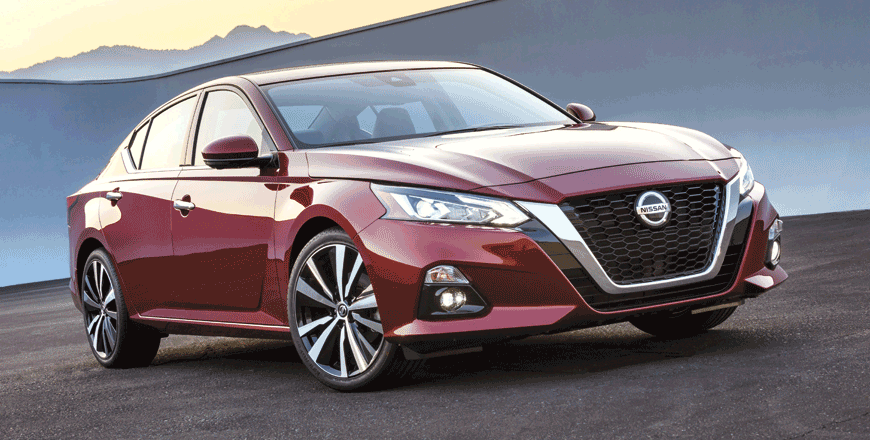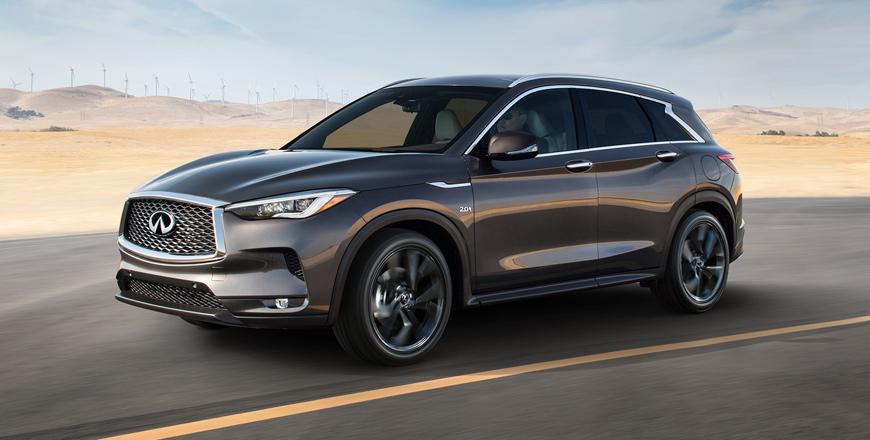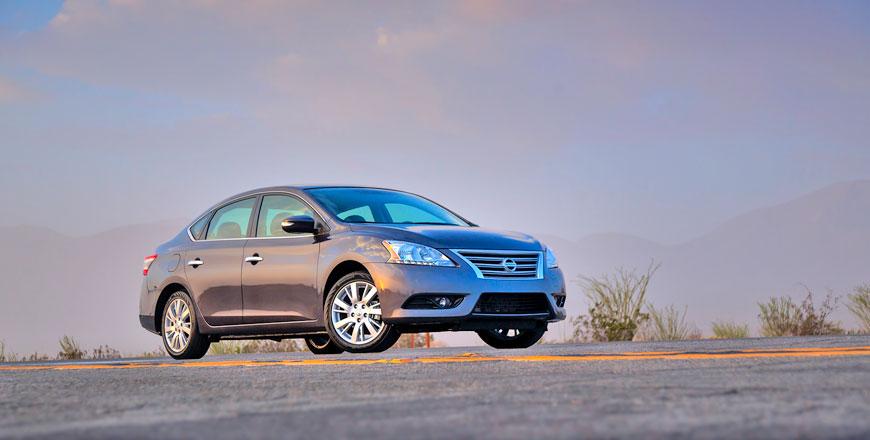You are here
Nissan Sunny 1.6 SL: Small saloon’s new sporting sensibility
By Ghaith Madadha - Dec 06,2021 - Last updated at Dec 06,2021

Introduced for the 2020 model year the latest “N18” generation Nissan Sunny takes on a decidedly sportier design and character than its predecessor. With improved attention to detail, equipment and driving dynamic, the latest incarnation of Nissan’s long-running Sunny saloon adopts a more familiar design direction. Effectively replacing both, it immediate predecessor and slightly larger Sentra in Jordan, the new Sunny better consolidates Nissan’s local compact saloon segment, and in a wider scope, is a better integrated junior to the larger, sportier and more upmarket Nissan Altima and Maxima saloons.
Launched in Jordan in recent days, the Sunny’s sportier direction seems part of a trend to make traditional 4-door, “3-box” saloons more enticing to a car buying public near endlessly enamored with taller, heavier crossover SUVs. Longer, wider and lower than predecessors, the new Sunny strikes a more athletic stance, while, a lower sloping roofline cuts a rakishly sleek profile but comes at the cost of some rear headroom for tall passengers. That said, front headroom remains generous, while rear occupants in this segment are usually children or smaller adults.
Dramatic disposition
Sportier in dimension and shape, the new Sunny also adopt a strikingly more assertive aesthetic in it details and surfacing. Losing its immediate predecessor’s flatter flanks, small wheels and overly rounded extremities, the new Sunny’s cultivates a sense for the dramatic. It employs sharp, deep and flowing creases and character lines and a layered styling sensibility to widen its stance, reduce visual height and create a sense of dynamic momentum. Urgent in disposition, the new Sunny features slim scowling headlights and prominently aggressive and angular lower and side bumper elements.
Echoed by a lower air intake style, the Sunny’s latest familial “V-motion” grille design is snooty and sporty, with slimmer chrome details and wider black outline elements. Beneath its muscularly creased and stepped clamshell bonnet, the Sunny is powered by Nissan’s familiar, eager-revving naturally-aspirated 1.6-litre 4-cylinder engine, driving the front wheels through seamlessly smooth continuously variable transmission (CVT). The sole regional engine option, the Sunny’s 1.6-litre here develops 118BHP at 6,000rpm and 110lb/ft torque at 4,400rpm, which allows for estimated 11-second 0-100km/h acceleration and low 5.2l/100km combined fuel efficiency.
Smooth and seamless
Progressive in delivery, the Sunny’s engine is as responsive from idling and versatile in mid-range as necessary to keep a good pace, but is best when reaching for its redline. Perky and eager, if not a “performance” model, the Sunny confidently carries its restrained 1,238kg mass. Refined and smooth for quiet daily driving, the Sunny’s engine is however not over-insulated at higher revs. Responsive and adequately capable even when overtaking at speed or on inclines, the Sunny’s CVT acts to seamlessly alter ratios to best exploit its moderate power and torque output.
Adept at making small ratio changes to maintain performance and momentum or alternatively for smooth fuel efficiency, the Sunny’s CVT is one of the more intuitive such systems, and better allows the engine to rev freely when needed than more restrictive CVTs. That said, the Sunny’s CVT does not feature pre-set ratios that mimic a traditional gearbox for added driver autonomy and control, as other Nissans do. Instead, the driver can select a general “L” mode for low ratio, high rev situations and for additional steep descent engine braking.
Eager and committed
About as sporty as its styling suggests in its driving dynamics, the Sunny is agile and light on its feet, yet, is sure-footed through corners and reassuring at speed. With quick and accurate, if somewhat clinical electric-assisted steering, the Sunny turns into sudden and sharp corners with a tidy responses, and very little sense on at the limit understeer. Eager and agile, if not quite as nimble as a smaller Nissan Micra, the Sunny dispatches successive direction changes in its stride, and delivers a higher degree of mechanical rear grip than expected.
Committed through corners with terrific lateral road-holding, the Sunny meanwhile maintains good cornering body control with little roll. Well-balancing ride and handling properties, the Sunny is smooth and comfortable in town, at speed and over most imperfections, and is firm but forgiving over sharper and jagged bumps and cracks. Well-resolved in vertical control and rebound over bumps, dips and crests, the Sunny was settled during a long test drive, with only one brief briskly driven, roughly paved and steeply inclining stretch perhaps calling for ever so slightly firmer damping.
Sporty sensibility
With a pleasantly, if not overtly sporty ambiance inside, the new Sunny’s cabin features pronounced circular side vents, chunky height adjustable sports steering wheel and an intuitive infotainment system. Driving position is comfortable and supportive with easy reach of all controls. It includes a slim seat-integrated armrest, but no adjustable lumbar support or rear centre armrest. Visibility is for the most part good and the Sunny is easy to park and maneuver, but one does tend to peer around the thick and steeply sloped A-pillars through briskly driven corners.
Providing decent rear legroom and generous boot space accommodating an estimated at 474-litres volume, the top specification Sunny SL is meanwhile a well-equipped, rather than over-equipped compact saloon. With a host of convenience, assistance and safety features, the Sunny SL is trimmed with fabric upholstery — better in dark colours — and features sportily subtle faux-carbon fibre interior and exterior accents. However, and most useful for busy Amman roads, the Sunny SL does come with blindspot and rear cross traffic warnings, and 360° view reversing camera and parking sensors.
Nissan Sunny 1.6 SL
Engine: 1.6-litre, transverse 4-cylinders
Bore x stroke: 78 x 83.6mm
Valve-train: 16-valve, DOHC
Gearbox: Continuously variable transmission (CVT) auto, front-wheel-drive
Power, BHP (PS) [kW]: 118 (120) [84] @6,000rpm
Specific power: 73.8BHP/litre
Power-to-weight: 95.3BHP/tonne
Torque, lb/ft (Nm): 110 (149) @4,400rpm
Specific torque: 93.2Nm/litre
Torque-to-weight: 120.3Nm/tonne
0-100km/h: 11-seconds (estimate)
Fuel consumption, combined: 5.2l/100km (estimate)
Fuel capacity: 40-litres
Length: 4,496mm
Width: 1,740mm
Height: 1,455mm
Wheelbase: 2,618mm
Track, F/R: 1,519/1,529mm
Minimum ground clearance: 135mm
Aerodynamic drag co-efficiency: 0.32
Head room, F/R: 1,003/922mm
Legroom, F/R: 1,130/787mm
Hip room, F/R: 1,292/1,272mm
Shoulder room, F/R: 1,348/1,361mm
Luggage volume: 474-litres (estimate)
Kerb weight: 1,238kg
Steering: Electric-assisted rack & pinion
Turning circle: 10.6-meters
Suspension, F/R: MacPherson struts/torsion beam
Brakes, F/R: Ventilated discs/drums
Tyres: 205/55R16
Price, on-the-road: starting from/as driven: JD18,900/JD21,900 (no insurance)
Warranty: 5-years or 300,000km
Related Articles
Launched in 2018, the sixth generation Nissan Altima is the most technologically advanced incarnation of the Japanese manufacturer’s popular
Introduced for the 2019 model year, the second generation incarnation of Infiniti’s compact premium crossover is evolutionary in that it is
Positioned between similarly sized Japanese competitors like the Honda Civic and Toyota Corolla, and rugged, slightly smaller, and more affo
















